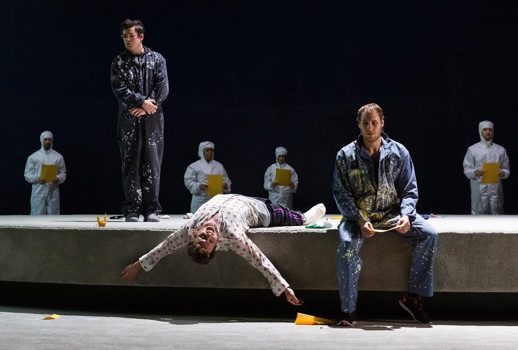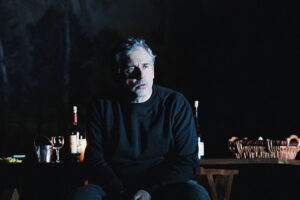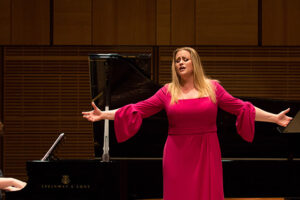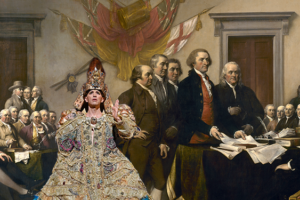

Adams’ amazing range of sonorities, colors, the richness of his almost romantic inspirations, his beautifully organized counterpoint and subtle use of motives and cells to create long melodies were wonderfully served. Small groups of instruments and soloists played with haunting beauty. Myers’ managed impeccable balances, integrated the electronic elements of the writing adroitly, and achieved a clarity of intent and rightness of touch to which the orchestra responded spectacularly well. It was only in some of the big muscular movements that there wasn’t sufficient force or always confidence, especially as the long evening wore on.
The singing was just as impressive. The chorus (including many singers who have sung leading roles at Curtis) trained by Elizabeth Braden, the chorus master of Opera Philadelphia, was spectacular. In solo roles, graduate students trying parts meant for more mature voices, were splendid for the most part. All sang well, had Adams’ style and rhetoric down, managed clear verbal articulation, and phrased—where the production allowed—with artistry.
The sole musical misfire was the amplification of the voices. Adams asks for this device, but it was crudely handled, flat, and occasionally distorted at the first performance. In this small theater less definitely would have been more.
The piece itself is problematic, with phenomenally inventive music by the arguably great composer Adams, but with a preposterous libretto by the self-promoting Peter Sellars.
So the story goes, Doctor Atomic was a “big idea” that occurred to Pamela Rosenberg, then of the San Francisco Opera, in 1999. She approached Adams who at first resisted the idea of a work about “The Manhattan Project” and the inventors of the atom bomb. He had been burned by the anger provoked by The Death of Klinghoffer and admitted in interviews that after all, he didn’t really like opera, Mozart perhaps being the exception. He hated Madame Butterfly. But Adams had a glimmer of interest when he learned that Oppenheimer—for all his vast culture — also hated opera!
At any rate, Adams eventually was persuaded, finding a model for what he called “a post-nuclear holocaust sound” in the music of the great Edgar Varèse. The librettist for Nixon in China and The Death of Klinghoffer, Alice Goodman, departed the project after two years, leaving Sellars to devise a text which is a mélange of actual quotes from the participants and astonishingly pompous literary citations. He also directed the world premiere.
One can feel sympathy for the Curtis director, R. B. Schlather, tasked with dramatizing this sententiously ham-handed text. From a group of puppets spouting famous poems, he had to create recognizable human beings, people that an audience can understand and feel for. How?
Schlather and his designer, Paul Tate dePoo lll, came up with a raised stone circle in the center of a bare stage, backed by a black screen. Characters often performed on the raised circle, but also played on the stage surface. In act two, the insufferable Native American stereotype character, Pasqualita, intoned her endless, unintentionally funny doom-laden chants circling around it, and, at the end, two children crawled out from under the circle to stare at the audience.
Schlather took a very radical course with the performers. Given that his singers had neither the age nor the physical types of the middle-aged people they were impersonating, he deliberately went counter to any “realism” in the portrayals.
The opera began with a young male figure in a variety of bedclothes flopping and jerking on the circle, performing acrobatic feats. Perhaps this was someone really dying of radiation poisoning? But no, it was Dr. J. Robert Oppenheimer (Jonathan McCollough). Throughout the act, he rolled and toked joints (presumably laced with speed) to fuel further leaping, writhing and spasms while pulling items of clothing on and off.
McCollough was truly brave. He committed fully to this extreme physicality even though he had an enormous amount to sing. He has a fine middle weight baritone and, remarkably, managed focused tone and clear diction—until the great aria that ends act one, Batter my Heart three-personed God, a sonnet by John Donne.
But why this text? Why at his highest moment of self-understanding would a nuclear scientist about to unleash an unfathomably lethal weapon be invoking the Christian idea of the Trinity? Wouldn’t he be mourning what he has done, terrified at its implications, tremendously proud of his achievements and deeply ashamed? He gives a poetry reading—with the wrong stresses—instead? It is grotesque sentimentality.
Schlather had McCollough jump around during the orchestral interludes in this aria, leaving him short of breath and unable to articulate the words. It was understandable, even honorable, for Schlather to footnote the sophomoric dishonesty of the text but those good intentions misfired, effectively sabotaging composer and soloist.
Just as Schlather avoided the “suave, urbane” Oppenheimer, he avoided the “fiercely intellectual” Edward Teller. In this role, Tyler Zimmermann was also very brave, saddled as he was with the most embarrassing moment of an evening full of them. In act two, face painted as death, wearing only his underwear, he crossed the stage slowly with a begging bowl. Then he was parked upstage for the duration to laugh at the coming test. Zimmermann sang very well and articulated superbly but this was not a dramatic approach I can imagine any performer beinging off with success.
Schlather was most successful perhaps in the love scene in act one. Mrs. Oppenheimer, Kitty (Siena Licht Miller), was treated as a graduate student of great allure and the sexual nature of her relationship to her husband was given a very erotic realization through intimate touching, the sensuous removal of some of Kitty’s intimate garments and a very well-conveyed sense of increasing arousal by both performers. This is another gorgeous scene, set in large part to a poem by Muriel Rukeyser. Kitty sings to Oppenheimer, “only my fingers in your hair, only, my eyes splitting the skull to tickle your brain with love…”
Now, that’s sure to arouse an exhausted, anxiety ridden husband to sex! And it does, for he is turned on by her “noisy hair”. Nothing human, sexual or intimate is said in this scene, nothing that explicitly and specifically belongs to these characters at this moment. Adams cheats with his gorgeous melodic line, beautifully managed by Miller, and Schlather’s staging for once helps.”
It still exists in the re-do I sent you. Some trimming is fine but I do like pointing out another tendentious citation in the Rukeyser poem. But the final decision, of course, is yours.
The best solo singing came from Evan LeRoy Johnson who spun out Wilson’s line with a beautiful tenor. Vartan Gabrielian was impossibly thin as the fat obsessed General Groves but he and Dogukan Kuran (Hubbard) sang very well. Sophia Fiuza Hunt loaned her lovely voice to Pasqualita’s groaner aria, “The Cloud-Flower Lullaby”.
Schlather did have a few “big ideas” of his own. One was his depiction of acid rain, a massive drop from the flies onto the stage starting with black atom-shaped balloons and proceeding to all kinds of detritus, including a chair! (This required a massive cleanup effort during the intermission, more interesting than a lot of the show.)
Curtis was brave to mount this work, and did wonderfully by it musically. As an opera it raised some fascinating questions; for example, it is possible for the composer to stand utterly alone and transcend his text? Can an opera ever work with what amounts to the Spinal Tap of opera librettos?
Dr. Atomic does to a large degree in act one, but eventually Sellars’ inability to plot, over-reliance on exposition and addiction to quotation cause everything to stall. Adams might have been better off forgetting Edgar Varèse and studying Madame Butterfly.
Photo: Karli Cadel























Comments